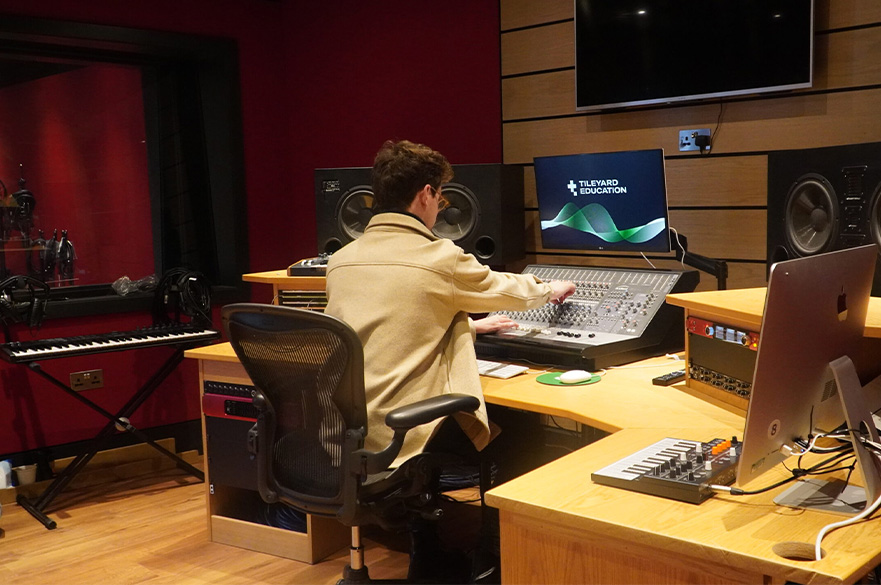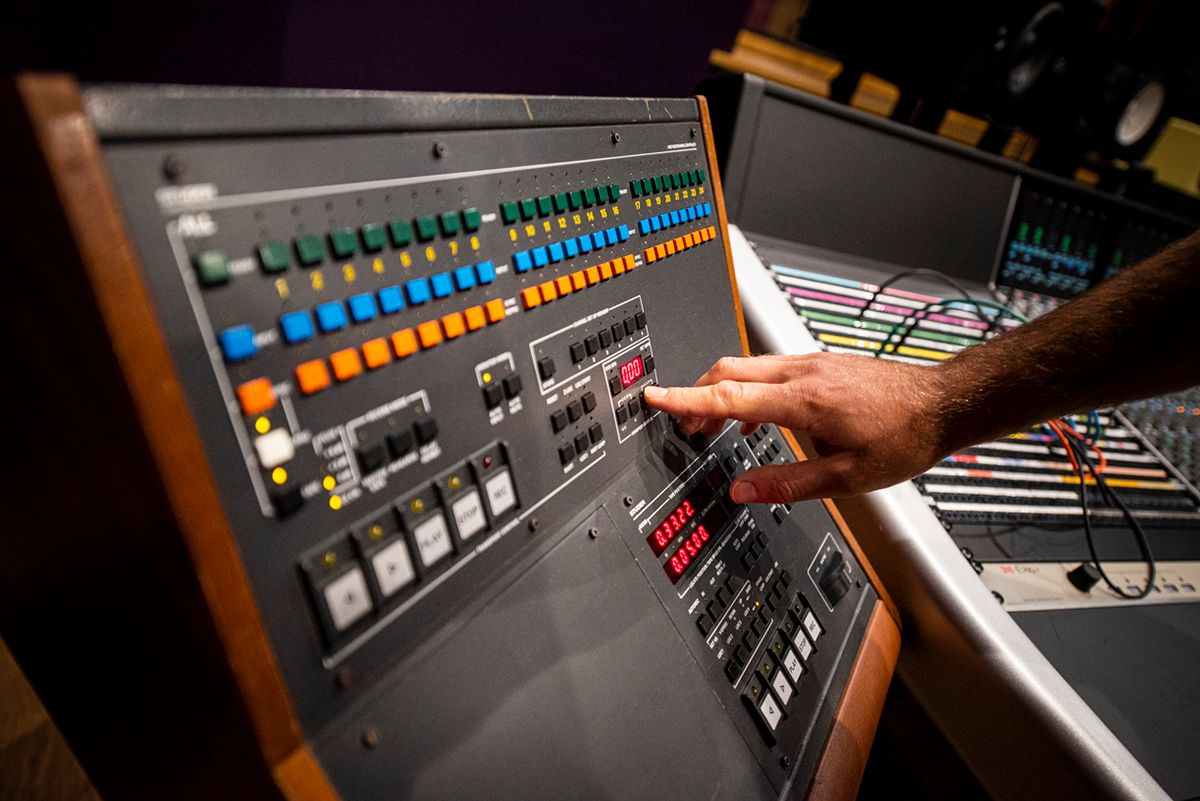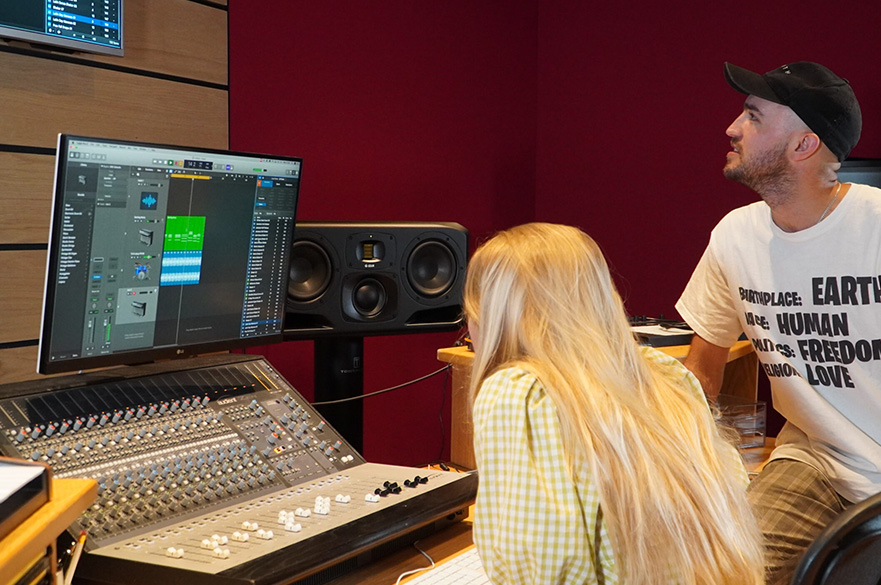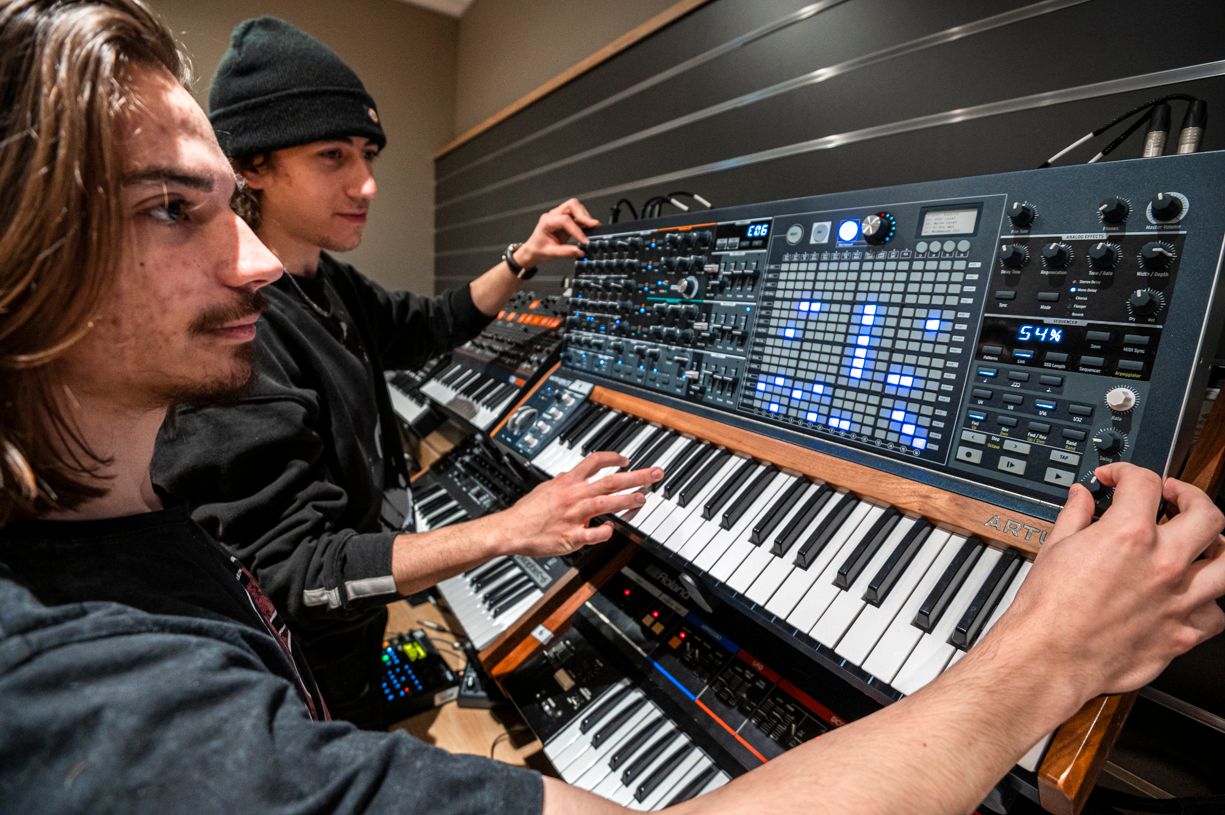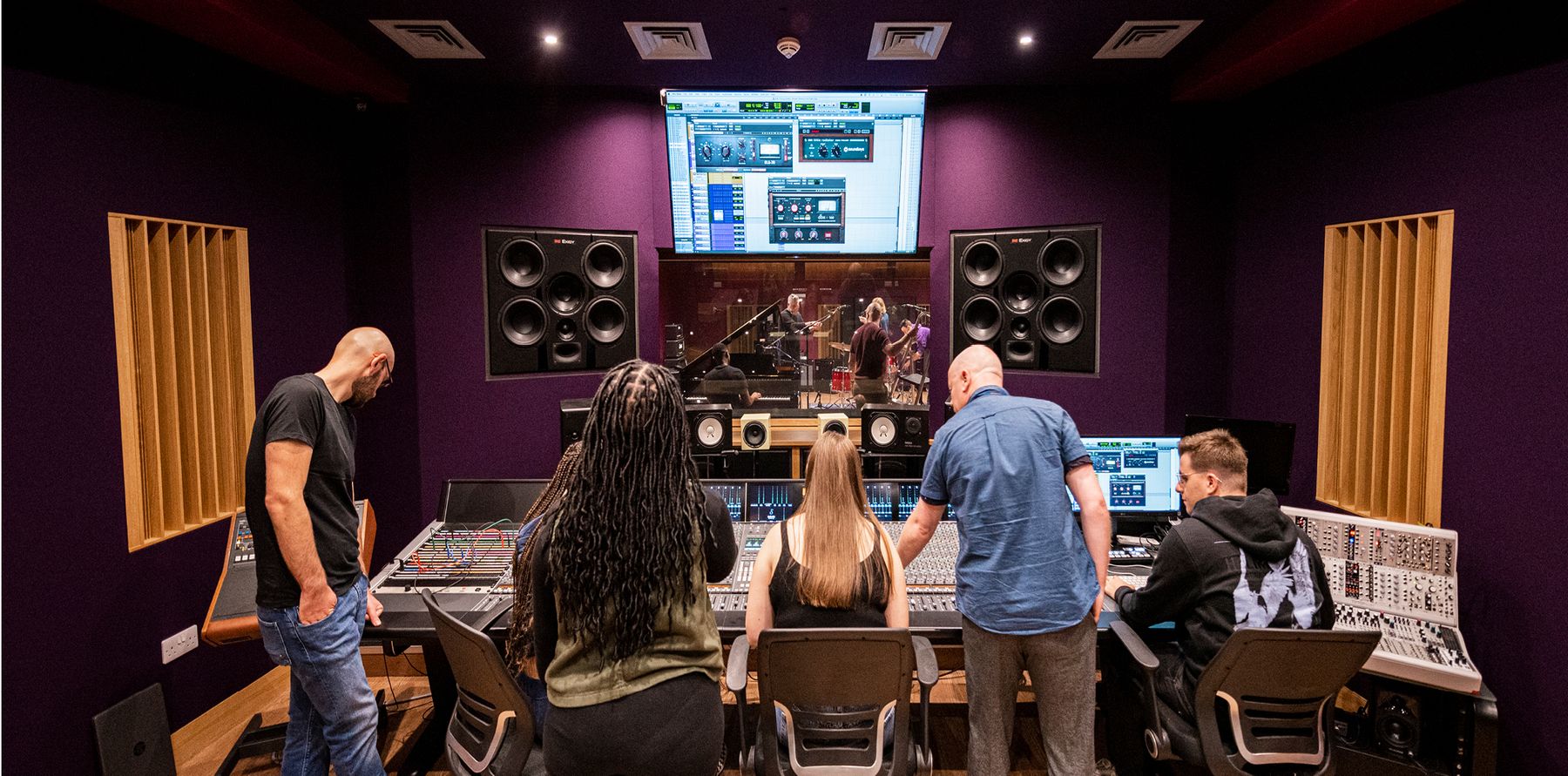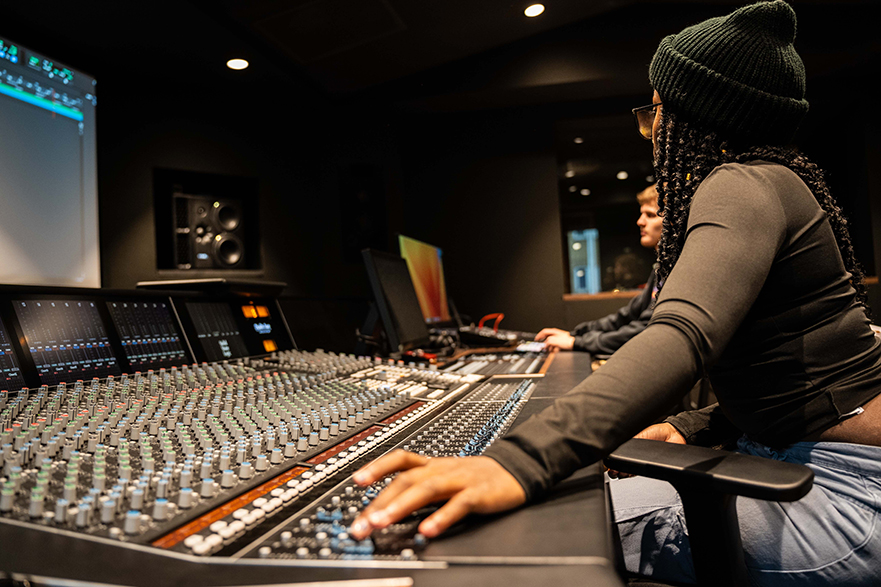Music Production - London MA
About this course
This degree is delivered at our London Campus in Whitechapel.
This course is designed for accomplished music producers working across an extensive range of genres - whether your passion lies in mainstream, experimental, alternative or traditional styles.
Taught in partnership with Tileyard, the world’s largest professional music community, the Music Production Masters degree challenges you to push creative boundaries, combining traditional and emerging practices to craft innovative solutions in sound design, recording, and production. You’ll engage with cutting-edge technologies and industry methods, applying them in ways that reflect their cultural and societal relevance.
Throughout the course, you’ll conduct in-depth research within your chosen specialism, exploring new possibilities and expanding your creative horizons. At the same time, you’ll build a personalised career development plan, honing the skills, attributes, and professional practices essential for success in the dynamic music production landscape.
You’ll be paired with an industry mentor, matched to your project and/or specialism. They’ll work with you throughout your studies, acting as an external source of advice, support, contacts, and possibly employment opportunities
The programme is focused on equipping you to navigate and excel in the rapidly evolving music industry, providing a solid foundation for future opportunities.
You’ll have access to NTU’s state-of-the-art Dante-networked production studios, enabling you to record acts worldwide with less latency than it takes for a snare hit to reach your ear. With facilities spanning both Nottingham and London campuses, you’ll gain access to two Dolby Atmos studios, eight production studios, 40 live rooms, and two synth labs. Paired with the unparalleled resources of the Tileyard community, this offers limitless opportunities to innovate and shape the future of music production.
Student Spotlight: Dan’s Journey into Sound Design
Dan studied the NTU x Tileyard MA in Commercial Music Production and now works as a developer at leading sample library company Spitfire Audio. In this video, he talks about how collaborative projects, access to professional studios, and industry mentoring helped him develop both his creative and technical skills.
What you’ll study
About the Tileyard community: Tileyard is home to 200+ creative businesses, and their studios are regularly used by A-listers like Dua Lipa and Noel Gallagher. Through their expertise and worldwide connections, you’ll be getting face-to-face with the people and tools most up-and-coming artists can only dream of.
Benefits of the NTU x Tileyard partnership: Enjoy the best of both worlds — NTU’s outstanding resources, plus exclusive access to Tileyard’s range of experts, events, and facilities.
Annual opportunities:
- Three Tileyard songwriting bootcamps
- Weekly live industry briefs
- Monthly A&R surgeries lead by Tileyard professionals
Exclusive facilities and events:
- Access to three bookable songwriting rooms at Tileyard Studios
- Access to the Tileyard ‘hang-out room’, and the chance to connect with their community
- Networking events with top industry professionals
- High-profile speakers and masterclasses
Professional development and perks:
- 40 hours’ work experience within Tileyard’s network
- Personalised mentorship from leading industry professionals
- Mentorship and funding opportunities through NTU’s Denizen record label
- Alumni privileges, including live commercial briefs and pitching opportunities through the Tileyard Investment Fund
Additional opportunities:
- Exclusive access to Tileyard’s Discord server for feedback, networking and collaboration
- The option to attend an international songwriting bootcamp (travel and insurance not included)
Creative Entrepreneurial Approaches (Music Production)
(60 credit points)
This module is designed to reflect the entrepreneurial nature of practices in the music and audio sector. Through appropriate negotiated research avenues, you will critically examine current ways of working most applicable to your own journey as a modern music industry professional, whether that’s as an employee, a business owner, or a freelancer with one or more audio/music related activities.
You’ll look for your place in the sector and work towards finding a home there during and after your studies by developing your subject and employability skills along with a relevant outward facing portfolio that considers you as a brand.
You’ll critically examine the work landscape to identify relevant professional opportunities during and after your studies to support your development, and, importantly, explore ways to monetise your talents. You’ll work on specific self-sourced or supplied industry facing projects and these will provide you with the opportunity to examine the skills needed in relevant key music sectors to help you thrive and survive.
In your ‘Practice’ module, you’ll explore and experiment with multiple related skills, and the relevant results of which can be finessed here and included in your work-facing portfolio, too. To give you the best chance to have long-term success you’ll have an assigned mentor from industry to give you a vital insiders perspective.
Ultimately you’ll form an output plan and will pitch for a ‘Confetti Employability Grant’ to help you with your next steps.
Music Production Practice
(60 credit points)
This is your Music Production playground! We all have our specialisms, but have you ever thought how you can apply those skills in related fields? The key to your development is going through the ‘doing’ process in a number of scenarios and examining how you can use what you learned in your own practice.
Through a series of workshops and projects you’ll explore and enhance your processes and skills in these related areas. You’ll experiment and see how related competencies can be developed to increase your employability across the music production sector: You might experiment mapping your studio production skills to live band MD-ing, or your electronic music productions as an artist to write music for media: you’ll work to personalise and apply these techniques to your own practice to enhance what makes you, you!
The key in this module is in the process and reflection, but assets related to your intended employability journey can be honed to completion for use in your ‘Creative Entrepreneurial Approaches’ module to show you at your very best.
Research Project
(60 credit points)
In an ever-shifting and more complex creative industry, the need to source, analyse and process knowledge has never been more important. Research is an essential skill in the toolbox for any creative practitioner wanting to have an extensive and rewarding career in a brave new world of opportunity and challenge.
The Research Project module enables you to collaborate with other creative cohorts and formulate life-long robust research practices. You will learn the essential skills necessary to investigate and synthesise information in order to develop informed conclusions and new and exciting practices. The module will enable you to take a deep dive into your own specialist areas of interest to deliver a large research project.
The project can be delivered in media that most closely align with your creativity, with outputs that could include a whole range of audio, visual or webspace artefacts.
We regularly review and update our course content based on student and employer feedback, ensuring that all of our courses remain current and relevant. This may result in changes to module content or module availability in future years.
How you're taught
The three key approaches to learning and teaching for this course are:
- Active Collaborative Learning
- Learning through Research
- Online or Blended learning
You will participate in workshops, lectures, small group and one-to-one tutoring designed to help you develop the practical and thinking skills that you will need in your chosen career. There is also a collaborative project along with online practice supporting portfolio development.
How you're assessed
You will be assessed in a number of ways, including:
- Written Assignments
- Reports
- Presentations
- Creative outputs/production
- Portfolio
Formative assessment is what we call the opportunities you have to produce and get feedback on work that will help you to prepare to complete your summative formal assessment. There are specific named activities in your assessment and feedback plan which you will be asked to complete and submit for feedback. Additionally, peer, class and individual feedback on your ongoing work is formative.
Assessment tasks are designed to challenge you over the year to increasingly demonstrate your own creativity, reflect your own interests and include independent research.
Careers and employability
Graduates will be equipped to take up roles working as a studio owner, recording engineer, producer, songwriter, mixing engineer, mastering engineer, music for media composer, artist, working for a record label/publisher.
Campus and facilities
This course is also available for online delivery. If you have chose this pathway certain facilities and resources available on our physical campus may not be accessible to you due to the nature of remote learning.
As part of our degree, you'll be working in the studio, collaborating with musicians, engineers and producers. And you're in for a treat, with world-class facilities...
We’ve worked closely with industry partner and leader, SSL, on creating a bespoke-built console. TriniTy is the first-of-its-kind system, delivering SSL’s SuperAnalogue sound, digital production power, and seamless integration.
Check out SSL’s announcement on their website.
You’ll find SSL ORIGIN consoles in all edit suites as standard. The studio mixing console has a traditional analogue studio workflow at its heart whilst providing the perfect partner for a modern DAW-driven ‘hybrid’ production studio.
Audio monitoring throughout the music facilities is provided by PMC and Focusrite Rednet interfaces throughout, allowing for audio recording to be captured remotely.
Metronome London is a purpose-built multi-discipline events and production space with the versatility built-in to function as a 600-capacity live venue, or a virtual production studio complete with LED volume.
Similar to our Nottingham venue, Metronome it's here where you'll gain valuable work experience and access world-class facilities.
Entry requirements
UK students
Academic Entry Requirements:
- A minimum of a 2:2 honours degree, or an appropriate equivalent, i.e. a professional qualification, from a recognised British or overseas institution, in a related subject, such as Music Technology, Music Production, Audio Production, Sound Design, Commercial Production, Sound Engineering, Audio Engineering, Game Audio, Audio for Media, Audio for Post Production, Audio for Visual Media, Composing for Media.
- If you don't hold a suitable degree, you should include a link to streamable recordings and/or compositions made with technology and state your role in recording and producing them. Write a short statement on the techniques you used to create the recordings that illustrate your suitability for the course along with any industry related experience
- Non-standard applicants with at least three years' industry experience are also welcome to apply.
- Applicants who do not fully satisfy the general criteria will be considered if they are able to demonstrate that they are capable of successfully undertaking and completing the programme at the required standard. Eligibility may be determined by means of an interview for some applicants.
- Applicants who have been taught and assessed in languages other than English should have an English language equivalent to IELTS 6.5.
Other Requirements:
Personal statement:
You should include in your personal statement why you want to study this course and a summary of your knowledge of music production including what instruments, hardware, software, consoles and outboard you use regularly.
Interview:
You'll be invited to an informal interview after you submit your application, to determine your project ideas, your fit with the course, and to discuss your aspirations.
Additional requirements for UK students
There are no additional requirements for this course.
Other qualifications and experience
We welcome applications from students with non-standard qualifications and learning backgrounds and work experience. We consider credit transfer, vocational and professional qualifications, and any work or life experience you may have.
You can view our Recognition of Prior Learning and Credit Transfer Policy which outlines the process and options available, such as recognising experiential learning and credit transfer.
Getting in touch
If you need more help or information, get in touch through our enquiry form.
International students
Academic Entry Requirements:
- A minimum of a 2:2 honours degree, or an appropriate equivalent, i.e. a professional qualification, from a recognised British or overseas institution, in a related subject, such as Music Technology, Music Production, Audio Production, Sound Design, Commercial Production, Sound Engineering, Audio Engineering, Game Audio, Audio for Media, Audio for Post Production, Audio for Visual Media, Composing for Media.
- If you don't hold a suitable degree, you should include a link to streamable recordings and/or compositions made with technology and state your role in recording and producing them. Write a short statement on the techniques you used to create the recordings that illustrate your suitability for the course along with any industry related experience
Other Requirements:
Personal statement:
You should include in your personal statement why you want to study this course and a summary of your knowledge of music production including what instruments, hardware, software, consoles and outboard you use regularly.
We accept equivalent qualifications from all over the world. Please check your international entry requirements by country.
English language requirements: See our English language requirements page for requirements for your subject and information on alternative tests and Pre-sessional English.
Additional requirements for international students
There are no additional requirements for this course.
English language requirements
View our English language requirements for all courses, including alternative English language tests and country qualifications accepted by the University.
If you need help achieving the language requirements, we offer a Pre-Sessional English for Academic Purposes course on our City campus which is an intensive preparation course for academic study at NTU.
Other qualifications and experience
We welcome applications from students with non-standard qualifications and learning backgrounds and work experience. We consider credit transfer, vocational and professional qualifications, and any work or life experience you may have.
You can view our Recognition of Prior Learning and Credit Transfer Policy which outlines the process and options available, such as recognising experiential learning and credit transfer.
Sign up for emails
Sign up to receive regular emails from the International Office. You'll hear about our news, scholarships and any upcoming events in your country with our expert regional teams.
Getting in touch
If you need advice about studying at NTU as an international student or how to apply, our international webpages are a great place to start. If you have any questions about your study options, your international qualifications, experience, grades or other results, please get in touch through our enquiry form. Our international teams are highly experienced in answering queries from students all over the world.
Policies
We strive to make our admissions procedures as fair and clear as possible. To find out more about how we make offers, visit our admissions policies page.



